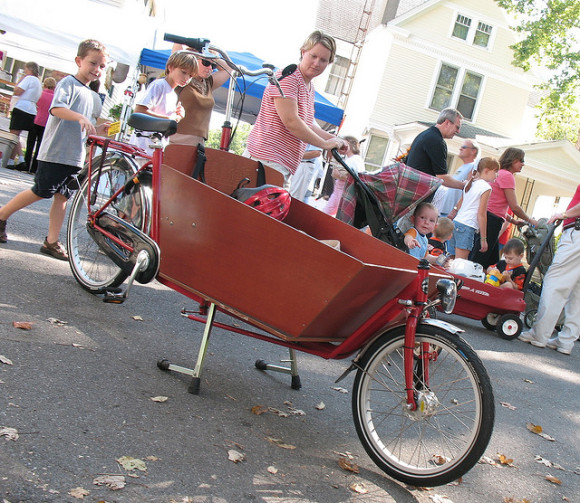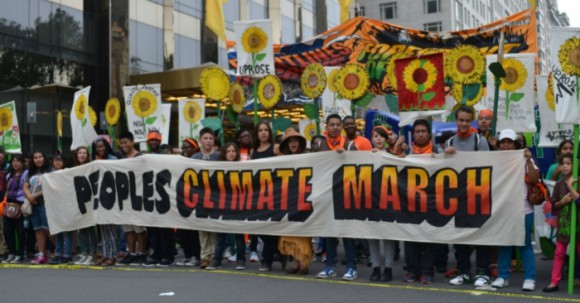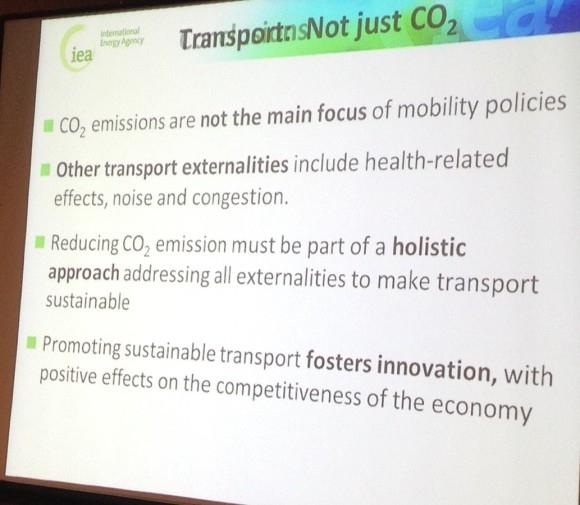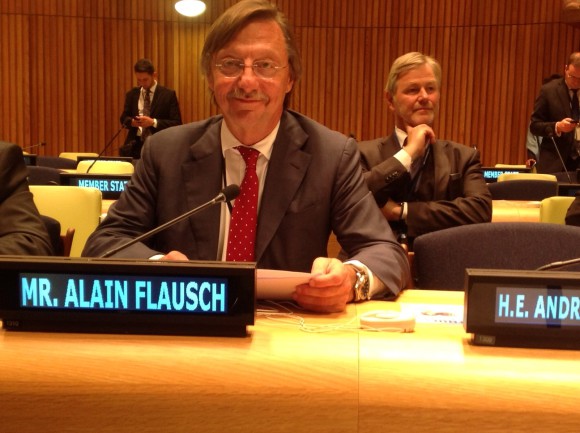
More cycling on the agenda: our permanent mission to the UN
Report from ECF’s and WCA’s Secretary General Bernhard Ensink on the UN Climate Summit in New York.
While countries have their permanent missions to the UN in New York City, ECF has its own special kind of ‘permanent mission’: More cycling on the agenda of the UN and other global institutions, such as the World Bank. This mission was one of the reasons that ECF recently launched the World Cycling Alliance which we presented to the UN last year in response to the call for voluntary commitments to fight climate change. Secretary General Dr Bernhard Ensink then accepted the invitation of the UN to join the summit as an observer.
People care about climate change
It’s evident that more and more people care about climate change; more than 300, 000 people appealed to the UN during the climate march through the streets of NYC last Sunday. The crowd brought with them many different messages with a wide-range of climate solutions. I was proud to take part as a representative of ECF and WCA and to see many bicycles in the march because ‘more cycling’ is an important part of the solution.


SLoCaT
A wide range of organisations (among them UN Habitat, UITP and ECF) acting together in a partnership for Sustainable Low Carbon Transport (SLoCaT) succeeded in ensuring that sustainable transport has an important place on the agenda of the UN. One successful tool of SLoCaT is high-level side events linked to UN summits, such as alongside the COP19 in Warsaw in 2013. A similar high-level event on sustainable transport took place last week on Monday 22nd September near Penn Station in NYC.
Parallel high-level meetings
What participants coming to the event saw was evidence that people want more cycling facilities; there were lines of people at NYC’s Penn Station city bike station waiting to hire bikes. Dr Joan Clos, Executive Director of UN Habitat, with whom ECF President Manfred Neun signed a memorandum of understanding this year in Medellin, once again demonstrated his great vision for urbanization. He really is an ally in cycling promotion, as he demonstrated in a press conference the next day.
Voluntary commitments, among them initiatives from SLoCaT members, were presented at the UN summit in parallel sessions. My most important conclusion is that almost everyone believes that ‘Yes, we can! We can reduce transport emissions!’ More and more people realize that business as usual will lead to a doubling in the numbers of cars from 1 billion to 2 billion by 2050– and that this is a horror scenario. But what if all cars were electric? (Today, there are only 500, 000 electric cars). Even then it would still be a horror scenario for cities! We need to shift to sustainable transport: walking and cycling (active mobility) and more public transport. I am happy of course with initiatives of the rail sector (UCI) and the public transport sector (UITP) and with the UN-Habitat’s initiative regarding electric vehicles. They all help to shift away from individual motorized transport to more walking, cycling and using PT, and to improve the engines of those vehicles that we will still need in the future.
UITP Secretary General presenting the voluntary commitments of UITP members.
More people are supporting cycling: urban policies should too
Electrification of PT vehicles, authorities’ fleets, taxi cabs and car-sharing systems are all important improvements. When people refer to the fact that we have 500, 000 electric cars, I stress that we already have 20 million electric assisted bicycles worldwide – 40 times more than electric cars! The growing popularity of cycling, bicycle rental schemes (‘public cycling’) and not to mention the existing 20 million electric assisted bicycles, shows the economic importance of the cycling industry and the need for good infrastructure for bicycles. Last but certainly not least, is the significance of individuals who are taking the decision to shift away from individual motorized transport to more walking, cycling and PT.
ECF and the WCA work on the promotion of cycling on the international level and we are ready to collaborate with our allies on concrete projects. In New York, we were involved in UN Habitat’s initiative on electric vehicles, an initiative that – in line with Dr Joan Clos’ vision – does not only focus on the single issue of electrification of vehicles. Rather, it wants to support cities to develop an integrated approach for sustainable transport which may include elements such as the electrification of bicycle rental schemes.
Next steps for ECF on the international level
The next important steps in the context of climate change are the COP20 summit in Lima, Peru in December 2014, and the COP21 in Paris in 2015. ECF and WCA will be following the developments in order to keep having an impact on the UN’s agenda. An extra opportunity for our ‘permanent mission’ to the UN is that our next cycling summit is also in France in 2015 (Velo-city 2015 Nantes, 2-5 June).
Habitat III
But there is another parallel road – which is maybe even more important for our mission to the UN and for opportunities to integrate ‘more cycling’ into sustainable urban developments: the road to Habitat III, the very important global summit to be organized by UN-Habitat in 2016. Habitat III will work on the Sustainable Development Goals to be decided on by the UN over the next few months, and will hopefully break them down into concrete actions for urban sustainability (We will be reporting on this in full in the coming weeks, watch this space).

Philippe Benoit's presentation, from the International Energy Agency.
Why cycling solves many problems
ECF and WCA focusses on ALL the reasons cycling is a good idea. Cycling has so many benefits for people, the planet and for the global economy, not just combatting climate change. More cycling contributes to an energy efficient and low carbon economy, but also to the social welfare of people, access to public spaces, jobs, services for all, livability of cities and empowers people to use their own energy to move!
- Log in to post comments
Contact the author
Recent news!
Upcoming events
Contact Us
Avenue des Arts, 7-8
Postal address: Rue de la Charité, 22
1210 Brussels, Belgium










